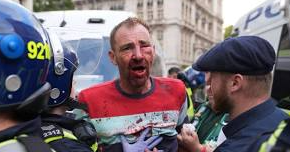Best Free Resources for Traders in 2025: From Charts to AI Alerts
December 01 , 2025

Tommy Robinson leads the Unite the Kingdom march in London. Explore what sparked the London protests, who Tommy Robinson is, and the wider implications for UK politics.
London has once again become the epicenter of political unrest and public demonstrations, with Tommy Robinson leading the controversial Unite the Kingdom march. As thousands gather in the capital, the protests raise questions not only about freedom of speech and national identity but also about the state of politics in the United Kingdom. With London protests today capturing international headlines, the figure of Tommy Robinson stands at the center of debate, drawing both support and condemnation.
Tommy Robinson, born Stephen Yaxley-Lennon, is one of the most polarizing figures in British politics. Known primarily as the founder of the English Defence League (EDL), Robinson has long positioned himself as a voice against what he sees as political correctness, mass immigration, and the erosion of traditional British values. His critics, however, argue that he promotes division, fuels anti-Islamic sentiment, and destabilizes communities.
Despite his controversial reputation, Robinson has maintained a significant following. His speeches, marches, and online presence continue to attract large crowds, demonstrating that his influence in the UK political and cultural landscape cannot be dismissed.
The Unite the Kingdom march in London was framed as a rallying cry for patriotism, free speech, and resistance against what Robinson and his supporters perceive as government overreach and cultural erosion. The march has drawn thousands of demonstrators, creating a tense atmosphere in the heart of London.
Supporters describe the event as a peaceful show of unity, while opponents warn that such gatherings can escalate tensions and encourage extremist rhetoric. The march has quickly become one of the most discussed UK protests in recent memory, bringing together groups from across the political spectrum, each with their own agendas.
London protests today are not limited to Tommy Robinson and his supporters. The city has become a flashpoint for multiple demonstrations, including counter-protests organized by anti-fascist groups, human rights advocates, and citizens concerned about the rise of far-right politics. This convergence of movements has created a volatile environment where the risk of clashes remains high.
For many Londoners, the protests represent deeper frustrations with politics in Westminster, economic pressures, and social divides. Whether marching with Robinson or against him, demonstrators see the capital as the stage where their voices can be heard the loudest.
The title of the march, Unite the Kingdom, suggests a call for solidarity. Yet, many argue that Tommy Robinson’s leadership does the opposite — deepening divides rather than bridging them. Critics claim his rallies are less about unity and more about fueling anger toward minorities, immigrants, and political elites.
At the same time, supporters argue that Robinson is raising legitimate concerns ignored by mainstream politicians. They believe that the government and media fail to address critical issues such as national security, border control, and free speech, forcing citizens to rally under Robinson’s banner.
Interestingly, Robinson’s movement has drawn parallels with right-wing populist figures abroad. Mentions of London Charlie Kirk during the protests highlight the global overlap between UK and US political movements. Kirk, a prominent conservative voice in America, shares themes similar to Robinson’s — including opposition to progressive policies and a call for traditional national values.
This connection suggests that Robinson’s appeal is not confined to the UK alone. Instead, his movement reflects a broader international trend where populist figures gain traction by capitalizing on public discontent and a sense of cultural displacement.
The Metropolitan Police were heavily deployed during the London march, aiming to prevent violence and ensure public safety. Roads were closed, barriers erected, and officers stationed throughout central London. Despite these measures, tensions flared in isolated incidents, underscoring the difficulty of managing protests in such politically charged environments.
Government officials have expressed concern about the growing number of UK protests centered around divisive figures like Robinson. While acknowledging the right to free assembly, many argue that such movements risk destabilizing communities and inflaming tensions at a time when national unity is desperately needed.
The London protests today have sparked a wave of media coverage, both supportive and critical. Mainstream outlets often highlight the dangers of far-right gatherings, while Robinson’s supporters accuse the press of bias and misrepresentation. This tug-of-war in public perception mirrors the broader political divides gripping the UK.
Social media platforms have further amplified the protests. Hashtags related to the Unite the Kingdom march trended across Twitter and Instagram, allowing both supporters and critics to voice their opinions in real time. This digital dimension has transformed the protests from a London-centric event into a global talking point.
The Tommy Robinson march raises important questions about the state of democracy, identity, and political discourse in the UK. Is the country moving toward greater division, or can such protests spark a necessary conversation about national values and unity? The answer is far from clear.
What is clear, however, is that Robinson remains a figure who cannot be ignored. Whether viewed as a defender of free speech or a threat to social cohesion, his presence on the streets of London reflects the deep fractures running through British society today.
The Unite the Kingdom march has placed Tommy Robinson back in the spotlight, forcing London and the wider UK to confront uncomfortable questions about national identity, free speech, and political polarization. As thousands take to the streets in both support and opposition, the protests demonstrate that Robinson’s influence — and the debates surrounding him — are far from over.
For now, London remains both the stage and the battleground for these defining struggles. Whether the city emerges more united or further divided will depend on how leaders, citizens, and institutions respond to the pressures of this moment.
#TommyRobinson #LondonProtests #UniteTheKingdom #LondonMarch #UKProtests #PoliticalUnrestUK #FreedomOfSpeech